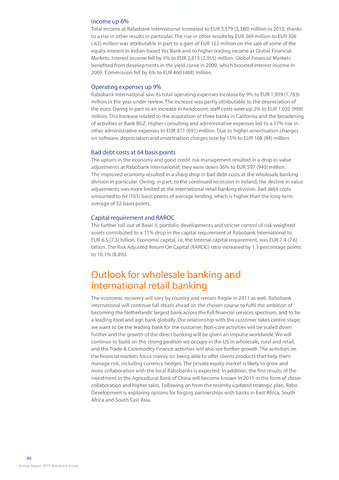Outlook for wholesale banking and
international retail banking
Bad debt costs at 64 basis points
Income up 6%
Total income at Rabobank International increased to EUR 3,579 (3,380) million in 2010, thanks
to a rise in other results in particular. The rise in other results by EUR 369 million to EUR 306
(-63) million was attributable in part to a gain of EUR 152 million on the sale of some of the
equity interest in Indian-based Yes Bank and to higher trading income at Global Financial
Markets. Interest income fell by 5% to EUR 2,813 (2,955) million. Global Financial Markets
benefited from developments in the yield curve in 2009, which boosted interest income in
2009. Commission fell by 6% to EUR 460 (488) million.
Operating expenses up 9%
Rabobank International saw its total operating expenses increase by 9% to EUR 1,939 (1,783)
million in the year under review.The increase was partly attributable to the depreciation of
the euro. Owing in part to an increase in headcount, staff costs were up 2% to EUR 1,020 (998)
million. This increase related to the acquisition of three banks in California and the broadening
of activities at Bank BGZ. Higher consulting and administrative expenses led to a 17% rise in
other administrative expenses to EUR 811 (691) million. Due to higher amortisation changes
on software, depreciation and amortisation charges rose by 15% to EUR 108 (94) million.
The upturn in the economy and good credit risk management resulted in a drop in value
adjustments at Rabobank International; they were down 36% to EUR 597 (940) million.
The improved economy resulted in a sharp drop in bad debt costs at the wholesale banking
division in particular. Owing, in part, to the continued recession in Ireland, the decline in value
adjustments was more limited at the international retail banking division. Bad debt costs
amounted to 64 (105) basis points of average lending, which is higher than the long-term
average of 52 basis points.
Capital requirement and RAROC
The further roll-out of Basel II, portfolio developments and stricter control of risk-weighted
assets contributed to a 11% drop in the capital requirement at Rabobank International to
EUR 6.5 (7.3) billion. Economic capital, i.e. the internal capital requirement, was EUR 7.4 (7.6)
billion. The Risk Adjusted Return On Capital (RAROC) ratio increased by 1.3 percentage points
to 10.1% (8.8%).
The economic recovery will vary by country and remain fragile in 2011 as well. Rabobank
International will continue full steam ahead on the chosen course to fulfil the ambition of
becoming the Netherlands' largest bank across the full financial services spectrum, and to be
a leading food and agri bank globally. Our relationship with the customer takes centre-stage;
we want to be the leading bank for the customer. Non-core activities will be scaled down
further and the growth of the direct banking will be given an impulse worldwide. We will
continue to build on the strong position we occupy in the US in wholesale, rural and retail,
and the Trade Commodity Finance activities will also see further growth. The activities on
the financial markets focus mainly on being able to offer clients products that help them
manage risk, including currency hedges. The private equity market is likely to grow and
more collaboration with the local Rabobanks is expected. In addition, the first results of the
investment in the Agricultural Bank of China will become known in 2011 in the form of closer
collaboration and higher sales. Following on from the recently updated strategic plan, Rabo
Development is exploring options for forging partnerships with banks in East Africa, South
Africa and South East Asia.
40
Annual Report 2010 Rabobank Group

